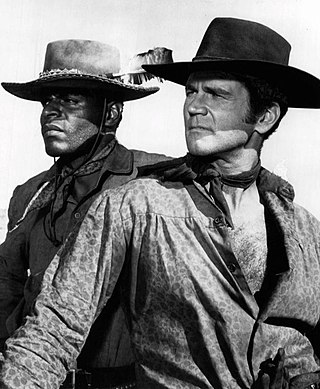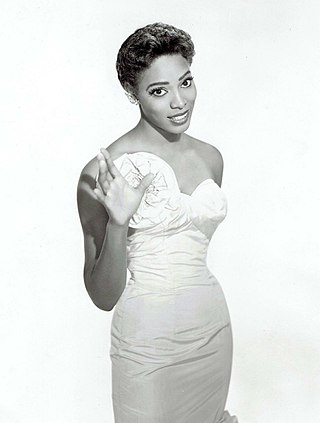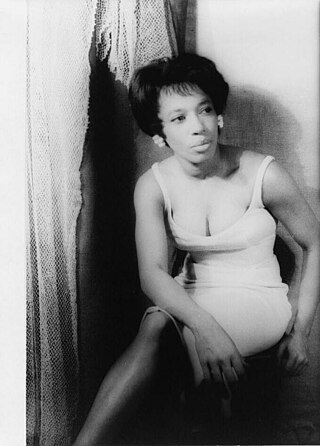
Paul Edward Winfield was an American actor. He was known for his portrayal of a Louisiana sharecropper who struggles to support his family during the Great Depression in the landmark film Sounder (1972), which earned him an Academy Award nomination. He portrayed Martin Luther King Jr. in the 1978 television miniseries King, for which he was nominated for an Emmy Award. Winfield was also known for his roles in Star Trek II: The Wrath of Khan, The Terminator, L.A. Law, and 24 episodes of the sitcom 227. He received four Emmy nominations overall, winning in 1995 for his 1994 guest role in Picket Fences.

Diahann Carroll was an American actress, singer, model, and activist. Before her death she was one of the last remaining stars from the Golden Age of Hollywood. Carroll was the recipient of numerous stage and screen nominations and awards, including her Tony Award in 1962, Golden Globe Award in 1968, and five Emmy Award nominations.

The Mod Squad is an American crime drama series, originally broadcast for five seasons on ABC from September 24, 1968, to March 1, 1973. It starred Michael Cole as Peter "Pete" Cochran, Clarence Williams III as Lincoln "Linc" Hayes, Peggy Lipton as Julie Barnes, and Tige Andrews as Captain Adam Greer. The executive producers of the series were Aaron Spelling and Danny Thomas.

Terresa M. Graves, credited as Teresa Graves, was an American actress and singer best known for her starring role as undercover police detective Christie Love in the ABC crime-drama television series Get Christie Love! (1974–1975). Graves was the first African-American woman to star in her own hour–long television series and the first for a drama television series.

The Hollywood Palace is an hourlong American television variety show broadcast Saturday nights on ABC from January 4, 1964, to February 7, 1970. Titled The Saturday Night Hollywood Palace for its first few weeks, it began as a midseason replacement for The Jerry Lewis Show, another variety show, which lasted only three months.

A black sitcom is a sitcom that principally features black people in its cast. Prominent black sitcoms to date typically come from the United States with African American casts, forming a branch of African American comedy. Although sitcoms with primarily black characters have been present since the earliest days of network television, this genre rose to prominence in the 1990s, mostly then on upstart networks outside the Big Three.

Lloyd Benedict Nolan was an American stage, film and television actor who rose from a supporting player and B-movie lead early in his career to featured player status after creating the role of Captain Queeg in Herman Wouk's play The Caine Mutiny Court-Martial in the mid-1950s. Nolan won a Best Actor Emmy Award reprising the part in 1955 TV play based on Wouk's tale of military justice.

Jeanette Nolan was an American actress. Nominated for four Emmy Awards, she had roles in the television series The Virginian (1962–1971) and Dirty Sally (1974), and in films such as Macbeth (1948).

The Outcasts is an American Western television series, appearing on ABC in the 1968-69 season. The series stars Don Murray and Otis Young. It is most notable for being the first television Western with an African American co-star.

Ketty Lester is an American singer and actress known for her 1961 hit single "Love Letters", which reached the top 5 of the charts in the U.S. and the UK. She is also known for her role as Hester-Sue Terhune on the American television series Little House on the Prairie. In 2022 she was inducted into the Arkansas Black Hall of Fame.

Diana Patricia Sands was an American actress, perhaps most known for her portrayal of Beneatha Younger, the sister of Sidney Poitier's character, Walter, in the original stage and film versions of Lorraine Hansberry's A Raisin in the Sun (1959).
Color Adjustment is a 1992 documentary film that traces 40 years of race relations and the representation of African Americans through the lens of prime-time television entertainment, scrutinizing television's racial myths. Narrated by Ruby Dee, it is a sequel to Riggs’s Ethnic Notions, this time examining racial stereotypes in the broadcast age.

Judy Lenteen Pace is an American actress known for her roles in films and television shows, particularly blaxploitation films. Pace portrayed Vickie Fletcher on the TV series Peyton Place (1968–1969) and Pat Walters on the ABC drama series The Young Lawyers (1969–1971), for which she won an Image Award for Outstanding Actress in a Drama Series in 1970.

The Eleventh Hour is an American medical drama about psychiatry starring Wendell Corey, Jack Ging and Ralph Bellamy, which aired on NBC from October 3, 1962, to September 9, 1964.
The Court is an American legal drama television series created by Oliver Goldstick and Tom Schulman that aired on ABC from March 26 until April 9, 2002.

Dr. Kildare is an NBC medical drama television series which originally ran from September 28, 1961, until August 30, 1966, for a total of 191 episodes over five seasons. Produced by MGM Television, it was based on fictional doctor characters originally created by author Max Brand in the 1930s and previously used by MGM in a popular film series and radio drama. The TV series quickly achieved success and made a star of Richard Chamberlain, who played the title role. Dr. Kildare inspired or influenced many later TV shows dealing with the medical field. Dr. Kildare aired on NBC affiliate stations on Thursday nights at 8:30–9:30 p.m. until September 1965, when the timeslot was changed to Monday and Tuesday nights at 8:30–9:00 p.m. through the end of the show's run.

"Randy, Red, Superfreak and Julia" is the season premiere of the 4th season of Scandal, and is the 48th overall episode. It premiered on September 25, 2014, in the U.S. on ABC.
Ferdinand Leon Jr. was an African-American writer who wrote for television shows.

The following events occurred in September 1968:
Hank Brandt was an American film and television actor. He was known for playing Leonard Waggedorn in the American sitcom television series Julia from 1968 to 1971.

















